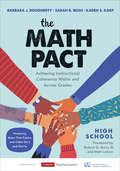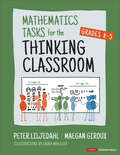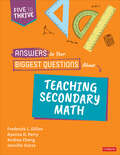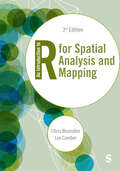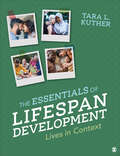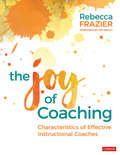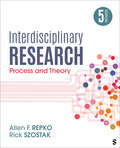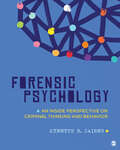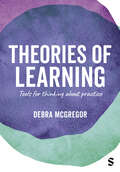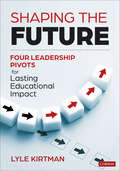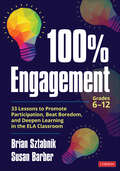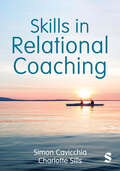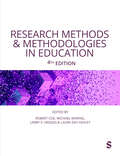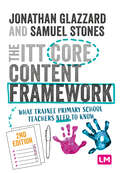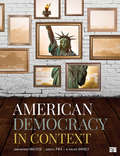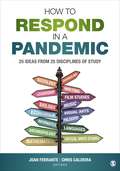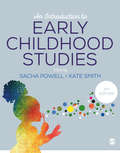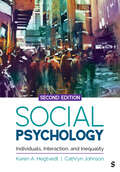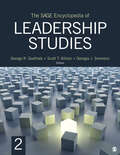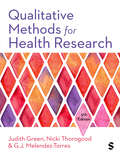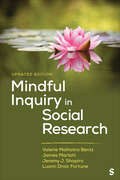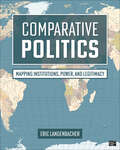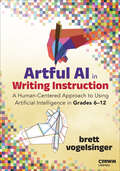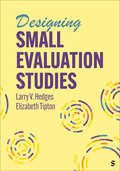- Table View
- List View
The Math Pact, High School: Achieving Instructional Coherence Within and Across Grades (Corwin Mathematics Series)
by Karen S. Karp Sarah B. Bush Barbara J. DoughertyA schoolwide solution for students’ mathematics success! Do you sometimes start to teach a mathematics concept and feel like you’re staring at a sea of bewildered faces? What happens when you discover students previously learned a calculation trick or a mnemonic that has muddied their long-term understanding? When "rules" seem to change from year to year, teacher to teacher, or school to school, mathematics can seem like a disconnected mystery for students. Clear up the confusion with a Mathematics Whole-School Agreement! Expanded from the highly popular "Rules that Expire" series of NCTM articles, this essential guide leads educators through the collaborative step-by-step process of establishing a coherent and consistent learner-centered and equitable approach to mathematics instruction. Through this work, you will identify, streamline, and become passionate about using clear and consistent mathematical language, notations, representations, rules, and generalizations within and across classrooms and grades. Importantly, you’ll learn to avoid "rules that expire"—tricks that may seem to help students in one grade but hurt in the long run. Features of this book include: • Abundant grade-specific examples • Effective working plans for sustainability • Barrier-busting tips, to-dos, and try-it-outs • Practical templates and checklists • PLC prompts and discussion points When teachers unite across grades, students hit the ground running every year. Take the next step together as a team and help all your students build on existing understanding to find new success and most importantly, love learning and doing mathematics!
Mathematics Tasks for the Thinking Classroom, Grades K-5 (Corwin Mathematics Series)
by Peter Liljedahl Maegan GirouxPractical and proven math tasks to maximize student thinking and learning Building upon the blockbuster success of Building Thinking Classrooms in Mathematics, Peter Liljedahl has joined forces with co-author Maegan Giroux to bring the Building Thinking Classrooms (BTC) framework to life in this new book, Mathematics Tasks for the Thinking Classroom, Grades K-5. But this book is so much more than simply a collection of good thinking tasks. It delves deeper into the implementation of the 14 practices from the BTC framework by updating the practices with the newest research, and focusing on the practice through the lens of rich math tasks that address specific mathematical learning outcomes or standards. Across the 20 non-curricular tasks and 30 curricular tasks used as models, this book: Helps you choose tasks to fit your particular math standards, goals, and the competencies you want your students to build Walks you through all the steps and scripts to launch, facilitate, and consolidate each task Shares examples of possible student solutions along with hints you might offer to help their thinking along Offers tasks for consolidation, example notes to my future forgetful self, and mild, medium, and spicy check-your-understanding questions (CYUs) for every thin sliced sequences of curricular tasks Imparts reflections from the authors on each task The book closes with specific guidance on how to find more tasks or craft your own non-curricular and curricular tasks, along with answers to educators’ frequently asked questions. It includes access to a companion website that includes downloadables and a task template for creating your own tasks. Whether you are new to BTC or a seasoned user, Mathematics Tasks for the Thinking Classroom, Grades K-5 will help teachers, coaches, and specialists transform traditional math classrooms into dynamic and thought-provoking learning spaces.
Answers to Your Biggest Questions About Teaching Secondary Math: Five to Thrive [series] (Corwin Mathematics Series)
by Frederick L. Dillon Ayanna D. Perry Andrea Negrete Cheng Jennifer OutzsLet’s face it, teaching secondary math can be hard. So much about how we teach math today may look and feel different from how we learned it. Teaching math in a student-centered way changes the role of the teacher from one who traditionally "delivers knowledge" to one who fosters thinking. Most importantly, we must ensure our practice gives each and every student the opportunity to learn, grow, and achieve at high levels, while providing opportunities to develop their agency and authority in the classroom which results in a positive math identity. Whether you are a brand new teacher or a veteran, if you find teaching math to be quite the challenge, this is the guide you want by your side. Designed for just-in-time learning and support, this practical resource gives you brief, actionable answers to your most pressing questions about teaching secondary math. Written by four experienced math educators representing diverse experiences, these authors offer the practical advice they wish they received years ago, from lessons they′ve learned over decades of practice, research, coaching, and through collaborating with teams, teachers and colleagues—especially new teachers—every day. Questions and answers are organized into five areas of effort that will help you most thrive in your secondary math classroom: How do I build a positive math community? How do I structure, organize, and manage my math class? How do I engage my students in math? How do I help my students talk about math? How do I know what my students know and move them forward? Woven throughout, you′ll find helpful sidebar notes on fostering identity and agency; access and equity; teaching in different settings; and invaluable resources for deeper learning. The final question—Where do I go from here?— offers guidance for growing your practice over time. Strive to become the best math educator you can be; your students are counting on it! What will be your first step on the journey?
An Introduction to R for Spatial Analysis and Mapping (Spatial Analytics and GIS)
by Chris Brunsdon Lex ComberThe ever-expanding availability of spatial data continues to revolutionise research. This book is your go-to guide to getting the most out of handling, mapping and analysing location-based data. Without assuming prior knowledge of GIS, geocomputation or R, this book helps you understand spatial analysis and mapping and develop your programming skills, from learning about scripting and writing functions to point pattern analysis and spatial attribute analysis. The book: Illustrates approaches to analysis on a range of datasets that are new to this edition. Enables you to put your skills into practice with embedded exercises and over 30 self-test questions. Showcases the possibilities of using spatial analysis to explore spatial inequalities. Whether you’re an R novice or experienced user, this book equips upper undergraduates, postgraduates and researchers with the tools needed for spatial data handling and rich analysis.
The Essentials of Lifespan Development: Lives in Context
by Tara L. KutherIn The Essentials of Lifespan Development, best-selling author Tara L. Kuther examines the ways in which contexts—culture, society, socioeconomic status, home, family, and even community—impact each stage of a person′s life. With its chronological organization, highly relatable examples, and vivid cross-cultural stories, Kuther connects the latest cutting-edge research to learners’ experiences and interdisciplinary career aspirations. Integrated examples; routine critical thinking questions; and a 16-chapter organization helps make the book engaging and accessible for all students. This title is accompanied by a complete teaching and learning package.
The Joy of Coaching: Characteristics of Effective Instructional Coaches
by Rebecca A. FrazierThe secrets of coaching excellence are already inside you Successful coaching has long been seen as a mental exercise—in order to do right by the teachers you serve, you put theory into practice, establish orderly processes, analyze data effectively, and implement externally mandated reforms. The truth, though, is that truly great coaches derive their success not just from what they do, but also from who they are. This groundbreaking book, based on research from an innovative mixed-methods study, provides a holistic approach to coaching that honors both mind and heart. As you explore the most important characteristics of the best instructional coaches—caring, authenticity, trustworthiness, flexibility, and more—you’ll develop and hone those same characteristics in yourself. Features include: · A framework and structure for developing the characteristics of effective instructional coaches · Comprehensive analysis of each characteristic · Examples and stories of effective coaching in action · Activities, exercises, and action points · Resources for encouragement and renewal School coaches have the power to make a real difference in the lives and futures of teachers and students. By balancing your outward competencies with the inspirational application of your own inward growth, you’ll bring new joy—and success—into your coaching relationships.
Interdisciplinary Research: Process and Theory
by Rick Szostak Allen F. RepkoThis book offers a comprehensive, systematic presentation of the interdisciplinary research process and the theory that informs it by drawing on student and professional work from a variety of fields. The book has been iterative in its development over editions, as the authors have learned from the work of instructors and students using it and have adjusted their advice in response. Notable changes in the Fifth Edition respond to feedback from the Forum devoted to this book in Issues in Interdisciplinary Studies in 2022. Examples have been updated so most are more contemporary, new content has been added on mixed methods and team research to respond to the needs of graduate students, and content has been revised throughout to address the current thinking on interdisciplinarity and integration, and strategies for achieving common ground as an interdisciplinary research team. An instructor website for the book at http://edge.sagepub.com/repko5e includes editable PowerPoint slides, a test bank, and figures and tables from the book.
Forensic Psychology: An Inside Perspective on Criminal Thinking and Behavior
by Kenneth B. CairnsForensic Psychology: An Inside Perspective on Criminal Thinking and Behavior offers undergraduates a concise, accessible introduction to the field of forensic psychology. With more than 20 years of experience as a forensic psychologist working with incarcerated people, Dr. Kenneth B. Cairns provides a balance between not just forensics and psychology, but also between theory and practical application. Grounded in the cognitive-behavioral approach and evidence based-practices and research, this text will focus on often-overlooked areas, such as the experiences of victims and first responders and the psychopathy of individuals convicted of mass murder, spree killing, and serial killing.
Theories of Learning: Tools for thinking about practice
by Debra McGregorTo be a successful teacher, or student of education, it is crucial to acknowledge the learning process. This book explains major learning theories, how they have developed, what beliefs and evidence they have been based upon and what they mean for teachers′ practice. Key areas considered include: How different theories, including behaviourism, constructivism, cognitivism and social culturalism, offer alternate perspectives about learning; Detailed case studies, in a range of school contexts, show how theoretical considerations play out in real situations; How a deeper understanding of learning theory can enhance your professional teacher knowledge and practice. The book also includes a range of practical tasks and questions for consideration to encourage deeper reflection about teaching and learning processes. This is essential reading for anyone training to teach in primary and secondary education, Education Studies students, and teachers seeking to refresh their knowledge and understanding of different perspectives of learning. Debra McGregor is Professor in Education at Oxford Brookes University.
Shaping the Future: Four Leadership Pivots for Lasting Educational Impact
by Lyle KirtmanElevate your leadership to inspire lasting change and student success. Public education is facing an unprecedented crisis. Exhausted educators are leaving the profession in record numbers, while persistent systemic issues and polarizing debates distract from the core mission of education—student success. Shaping the Future offers educational leaders a compelling guide to meet these challenges head-on and transform their leadership approach to improve outcomes for students and staff alike. Grounded in original research and rich experience in over 400 school districts, Lyle Kirtman introduces four pivotal leadership shifts to align vision, leadership practices, and student success. Additional features include: Practical frameworks and real-world examples demonstrating how to overcome persistent barriers in workforce challenges and accountability Strategies to integrate diversity and social emotional learning into goals and actions for academic excellence Reflection tools, case studies, and step-by-step guidance to help you act immediately and effectively in your unique context. This book equips leaders with tools to address misalignment in improvement strategies, low morale, and the retention crisis, while reigniting a collective focus on student achievement. Shaping the Future is more than a leadership guide—it’s a solution-driven call to action for anyone dedicated to sustaining public education and unlocking the potential of every learner.
100% Engagement: 33 Lessons to Promote Participation, Beat Boredom, and Deepen Learning in the ELA Classroom (Corwin Literacy)
by Susan Barber Brian SztabnikClassroom-tested lessons to help you strive for 100% engagement in your ELA classroom For educators, it can be a constant challenge to keep students engaged and motivated in the classroom. With the rise of technology and shortened attention spans, we have to go beyond traditional teaching methods, especially in the English Language Arts (ELA) classroom where students may perceive reading and writing as tedious tasks. 100% Engagement: 33 Lessons to Promote Participation, Beat Boredom, and Deepen Learning in the ELA Classroom offers captivating and interactive lessons that will help students thrive in their ELA studies. Authors Brian Sztabnik and Susan Barber provide practical guidance and inspiration to make ELA learning more meaningful and enjoyable for students in Grades 6-12. The book’s 33 lessons are organized by genres including Poetry, Short Fiction, Novels & Dramas, and Writing and are adaptable to support different learning styles, ensuring that all students feel valued and engaged in the classroom. The lessons get students out of their seats, participating in discussion, collaborating, and working across mediums to build their literacy skills. Providing tips and tricks to achieve 100% engagement, this book: Fosters a classroom where student motivation is high, and interactions are based on mutual respect and appreciation Challenges learners to think critically and creatively by incorporating collaborative, cross-genre activities Offers adaptations to help teachers tailor the lessons based on their individual classroom needs, making it easier for all students to participate fully Offers downloadable templates and handouts for easy implementation 100% Engagement is the ultimate toolkit for teachers looking to foster motivation, creativity, and active participation that deepens learning for every student in their ELA classroom.
Skills in Relational Coaching
by Charlotte Sills Simon CavicchiaThis illuminating guide to the core skills and techniques of the relational approach to coaching brings the intersubjective, collaborative relationship between coach and client into focus. The authors use key case examples from a variety of settings to illustrate the skills needed at different stages of the coaching relationship, including chapters on: · Establishing the Working Alliance · Inquiring Collaboratively · Use of Self · The Presenting Past · Enactments, Games, Ruptures and Repairs · Endings in Coaching Filled with a variety of exercises and reflective questions, this will be an invaluable resource for trainee coaches or those already practicing wishing to refine their skills.
Research Methods and Methodologies in Education
by Michael Waring Robert Coe Laura Day Ashley Larry V HedgeYour #1 resource for carrying out educational research as part of postgraduate study. High-quality educational research requires careful consideration of every aspect of the process. This all-encompassing textbook written by leading international experts gives you a considered overview of the principles that underpin research, and key qualitative, quantitative and mixed methods for research design, data collection and analysis. This fourth edition includes four new chapters on: Doing a literature review Measurement and validity Using R (with RStudio & Tidyverse) Data transparency, reproducibility, and replicability In addition, across the book, authors touch on the emergent use of generative AI tools as part of the educational research process. Also, chapters have been reordered to better reflect the research process and to emphasise commonalities between methodological approaches and tools. This is essential reading for postgraduate students on education courses and early career researchers looking to sharpen their research practice.
The ITT Core Content Framework: What trainee primary school teachers need to know (Ready to Teach)
by Samuel Stones Professor Jonathan GlazzardThis core, concise guide sets out the Core Content requirements for accredited Initial Teacher Training in England (the Core Content Framework (CCF)). It outlines, for primary trainees, what is expected of them – exploring what they need to ‘ *Learn that′ and ‘*Learn how to’. This second edition includes case studies in all chapters exemplifying good practice and making clear links between theory and practice. Also includes a new chapter on the Early Career Framework, supporting new teachers into their first years in the classroom.
American Democracy in Context
by John Anthony Maltese W. Phillips Shively Joseph A. PikaDiscover what makes American democracy unique and how its government impacts your life American Democracy in Context provides a combined comparative and historical approach to inspire students to better understand American government and become active citizens. Bestselling authors Maltese, Pika, and Shively explain the distinctive features of how Americans practice democracy—how they vote, translate election results into representation of interests, make policy decisions, enforce laws and maintain justice—and how those practices differ from other democracies throughout the world. The emphasis is always on the American political system, but the search for understanding encourages students to examine how the American system has developed over time (historical context) and how it compares with similar practices in other democracies (comparative context). This combined approach motivates students to understand why politics is relevant to their everyday lives and how they can affect changes and make a difference. This title is accompanied by a complete teaching and learning package. Digital Option / Courseware SAGE Vantage is an intuitive digital platform that delivers this text’s content and course materials in a learning experience that offers auto-graded assignments and interactive multimedia tools, all carefully designed to ignite student engagement and drive critical thinking. Built with you and your students in mind, it offers simple course set-up and enables students to better prepare for class. Assignable Video with Assessment Assignable video (available with SAGE Vantage) is tied to learning objectives and curated exclusively for this text to bring concepts to life. LMS Cartridge (formerly known as SAGE Coursepacks): Import this title’s instructor resources into your school’s learning management system (LMS) and save time. Don’t use an LMS? You can still access all of the same online resources for this title via the password-protected Instructor Resource Site.
How to Respond in a Pandemic: 25 Ideas from 25 Disciplines of Study
by Joan Ferrante Chris CaldeiraHow can an undergraduate college education prepare learners to cope with the current COVID-19 pandemic? This collection of short essays, written by experts in 25 academic fields of study, addresses this very question. Each chapter brings perspective and insight from that discipline, presenting one useful idea and a recommended course of action. This one-of-a-kind resource is ideal for students, instructors, and administrators, particularly during the 2020-2021-academic year when institutions are challenged to continue their educational missions in the midst of a public health crisis that affects every aspect of college life.
An Introduction to Early Childhood Studies
by Sacha Powell Kate SmithThis new edition of this bestselling textbook examines the key themes involved in the study of young children and childhood from a variety of disciplines and international perspectives, making essential links between theory and practice to help you apply your learning in real-life settings. Key additions include: the latest changes in early years policy 2 brand new chapters on Postmodernist theories in Education, and Education for Sustainable Development A renewed emphasis on reflective practice across Part 4, supporting and encouraging your professional development Throughout, case studies, exercises and links to further reading help you engage with key issues and test your learning, making it easier for you to get to grips with all aspects of your course.
Social Psychology: Individuals, Interaction, and Inequality (Sociology for a New Century Series)
by Karen A. Hegtvedt Cathryn J. JohnsonSocial Psychology is a comprehensive exploration of how individual behaviors and interactions shape societal dynamics and contribute to social inequalities. The Second Edition provides a unique, sociological perspective on social psychology that is both academically rigorous and accessible to undergraduates.
The SAGE Encyclopedia of Leadership Studies
by George R. Goethals Georgia J. Sorenson Scott Townsend AllisonLeadership Studies is a multi-disciplinary academic exploration of the various aspects of how people get along, and how together they get things done. The fields that contribute to leadership studies include history, political science, psychology, anthropology, sociology, philosophy, literature, and behavioral economics. Leadership Studies is also about the ethical dimensions of human behavior. The discipline considers what leadership has been in the past (the historical view), what leadership actually looks like in the present (principally from the perspectives of the behavioral sciences and political science), and what leadership should be (the ethical perspective). The SAGE Encyclopedia of Leadership Studies will present both key concepts and research illuminating leadership and many of the most important events in human history that reveal the nuances of leadership, good and bad. Entries will include topics such as power, charisma, identity, persuasion, personality, social intelligence, gender, justice, unconscious conceptions of leadership, leader-follower relationships, and moral transformation.
Qualitative Methods for Health Research (Introducing Qualitative Methods series)
by Judith Green Nicki Thorogood G.J. Melendez-TorresWhether you are looking to interpret and evaluate existing health research, or conduct your own, this book discusses every step of the research process, from theory and ethics to data collection, analysis and dissemination. Clear, engaging and drawing on diverse examples from various health disciplines – from public health and nursing to occupational health and nutrition – this fifth edition: Offers detailed guidance on synthesising and integrating evidence, with a new chapter on systematic reviews. Fully embeds material on the effective use of digital and social media research in health across all chapters. Showcases what health research looks like in practice, with 28 case studies from across the globe. Ideal for undergraduates, postgraduates and beginner researchers in health and related fields, this book is a vital resource for building your confidence in understanding and doing qualitative research.
Mindful Inquiry in Social Research
by Valerie Malhotra Bentz Jeremy J. Shapiro James Marlatt Luann Drolc FortuneThe first edition of this classic text introduced researchers and students to a broad range of approaches that are grounded philosophically and are relevant to real contexts. This new edition reflects developments in social research and changes in the global environment. The authors broaden their conception of mindfulness, and show how mindful inquirers can maximize positive outcomes for participants, organizations, communities, and themselves. The first five chapters describe the application of mindful inquiry, and the following nine introduce cultures of inquiry and research traditions, theories, methods, and techniques. Chapters contain activities that provide immediate engagement with learning, suggested readings, and lists of skills for researchers.
Theories of Learning: Tools for thinking about practice
by Debra McGregorTo be a successful teacher, or student of education, it is crucial to acknowledge the learning process. This book explains major learning theories, how they have developed, what beliefs and evidence they have been based upon and what they mean for teachers′ practice. Key areas considered include: How different theories, including behaviourism, constructivism, cognitivism and social culturalism, offer alternate perspectives about learning; Detailed case studies, in a range of school contexts, show how theoretical considerations play out in real situations; How a deeper understanding of learning theory can enhance your professional teacher knowledge and practice. The book also includes a range of practical tasks and questions for consideration to encourage deeper reflection about teaching and learning processes. This is essential reading for anyone training to teach in primary and secondary education, Education Studies students, and teachers seeking to refresh their knowledge and understanding of different perspectives of learning. Debra McGregor is Professor in Education at Oxford Brookes University.
Comparative Politics: Mapping Institutions, Power, and Legitimacy
by Eric A. Langenbacher"This book takes a new and interesting approach to introduce students to the foundations of comparative politics." —Marni Berg, Colorado State University Comparative Politics: Mapping Institutions, Power, and Legitimacy introduces students to the foundations of comparative politics while using mapping and data analysis to encourage them to think critically about ever-changing global relationships. Author Eric Langenbacher examines the key concepts of power and legitimacy through a variety of viewpoints, emphasizing the choices institutions make and why they make them. As students explore themes through world geography and data-based cases, they learn to reevaluate traditional ideas about national and other political borders and better assess the performance of political institutions.
Artful AI in Writing Instruction: A Human-Centered Approach to Using Artificial Intelligence in Grades 6–12
by Brett VogelsingerDiscover strategies to use AI thoughtfully in every stage of the writing process—without compromising creativity or critical thinking Feeling conflicted about integrating artificial intelligence (AI) into your writing instruction? You’re not alone. In a world where AI-generated text can seem like a writing teacher’s enemy, incorporating it into writing instruction may feel like an act of betrayal. The advent of generative AI might feel like "one more thing" eroding students’ capacity for deep thinking. Artful AI in Writing Instruction offers strategies and lessons for middle and high school teachers to harness AI in a positive way, integrating it into the writing process and evaluating the ethics of its usage. Written by a full-time high school teacher, Brett Vogelsinger, the book focuses on evergreen principles and ideas rather than specific AI tools, providing concrete steps and lessons that teachers can implement without being technology experts. Acknowledging the varying perspectives of teachers on AI in writing instruction, from skepticism to enthusiasm, Brett offers a human-centered, considered, and ethical approach to using generative AI in the classroom. Demonstrating how AI can be used artfully in the classroom to enhance students′ writing skills and foster reflection on the writing process, this book Provides standards-aligned lessons that detail how AI can support instruction and assist students at each step of the writing process from prewriting through publishing Emphasizes how to use AI tools to mine authentic human ideas and enhance creativity in the classroom Aims to help teachers build a healthy relationship with AI technology and use it thoughtfully in their writing instruction Includes chapter features such as quotes from esteemed writers, real teacher and student voices, cautionary notes, and "Bot Thoughts" entries of example AI output Artful AI in Writing Instruction is a book that explores technology with humility, critiquing its drawbacks and harnessing its strengths, in an effort to guide teachers on how to use AI to help students grow their thinking and their skills rather than bypassing that development.
Designing Small Evaluation Studies
by Larry V. Hedges Elizabeth Tipton"The book will be an important addition to instruction in designs for causal inference in the field of education. It is long overdue." - Thomas J. Lipscomb, The University of Southern Mississippi This text describes how to design and analyze small efficacy or evaluation studies, typically carried out as part of the development of programs or interventions in areas such as education. The problem facing many researchers is how to design a study that is as small as possible, yet big enough to yield relatively unambiguous evidence about an intervention’s average effect. This text begins with an overview of validity, causal inference, statistics, effect sizes, and measurement. The authors then focus on designs for small, randomized trials, followed by a section on non-randomized causal designs: here they focus on three designs most useful for small studies including the non-equivalent control group, difference-in-difference, and interrupted time series designs. The final section summarizes the book, compares designs, discusses approaches to choosing a design, and provides guidance on reporting. Five case examples are used throughout the book to illustrate the material and there is a glossary of terms and concepts.
